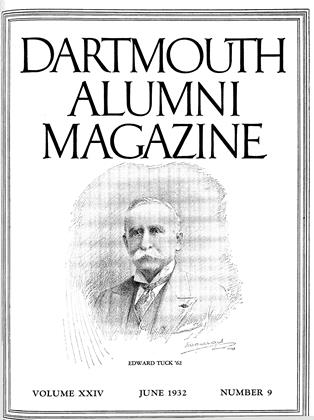In Hill's Dartmouth Traditions there appears an account of Delaware Tom, an educated Delaware Indian who was supposed to have been a student of "Moor's Indian Charity School." The chronicler, Charles Thomas Hallinan, Dartmouth '03, places this Indian's class as that of 1816. His full name, as given us by this same man, is Thomas Prentiss Hill. He also states that he was a graduate of the Medical School. However, there seems to have been a case of mistaken identity here. Under the year 1816 in the General Catalogueof Dartmouth College we find that Thomas Prentiss Hill graduated from the school of medicine in that year, but that he was a practicing physician in Sanbornton, N. H„ from 1816 to 1844 and that he moved to Hanover in 1844 where he practiced medicine until his death in 1866. From Lord's Historyof the Town of Hancmer we take the following: "Dr. Thomas Prentiss Hill, born in Conway, New Hampshire, a medical graduate in 1816, who after a long practice in Sanbornton, N. H., came to Hanover in 1844 and bought a drug store, which he kept for twelve years when he retired from business. He lived in the house on the northeast corner of Main and Elm Streets, and died there August 3, 1866, at the age of eighty-five."
It appears that the account from Dartmouth Traditions which seems to have been inspired by a somewhat similar account in Dye's McLoughlin and Old Oregon which tells of Delaware Tom in the following manner: "Here, in a lodge of deerskin, with his Nez Perce wife, dwelt Tom Hill, an educated Delaware Indian, once a student at Dartmouth, now an independent trapper in the mountains." It seems that this man did much during the forties of the last century to repell the White invasion that was taking the lands from the people in Oregon, and during the latter part of his life he changed his attitude and aided the Whites in their quest.
It is evident from the quotations that the account in Dartmouth Traditions has picked the wrong man. There is only one man by the name of Tom Hill that ever attended Dartmouth during the last century, and he was the man mentioned in the preceding paragraphs, a physician and druggist who never lived in the Great Northwest of the forties, nor is there any evidence pointing to Indian blood in his veins.
The man who seems to answer the description in many ways is a Joe Lewis. In an account of the life of Marcus Whitman there appears the following: "They were told that Dr. Whitman was poisoning them. There is scarcely a doubt that Joe Lewis circulated this story." Here the cause of a massacre is mentioned, and Joe Lewis, a half-breed Indian, is blamed for inciting his fellows to do the deed. I have been able to find no account of any Delaware Tom at any other point in the records of the college; probably the man had another appellation, or he attended another school, either is possible. In any case. Thomas Prentiss Hill cannot be the man.
 View Full Issue
View Full Issue
More From This Issue
-
 Article
ArticleEdward Tuck: A Biographical Sketch
June 1932 By Horatio S. Krans -
 Article
ArticleDartmouth's Greatest Benefactor
June 1932 By Russell R. Larmon -
 Class Notes
Class NotesCLASS OF 1910
June 1932 By Harold P. Hinman -
 Class Notes
Class NotesCLASS OF 1926
June 1932 By J. Branton Wallace -
 Sports
SportsIron Man
June 1932 -
 Class Notes
Class NotesCLASS OF 1905
June 1932 By Arthur E. McClary
Books
-
 Books
BooksFrom the Ground Up
APRIL • 1985 By Courtney C. Brown '26 -
 Books
BooksJUSTICE IN RUSSIA
December 1950 By DIMITRI VON MOHRENSCHILDT -
 Books
BooksSTATE CONTROL OF LOCAL FINANCE IN OKLAHOMA,
February 1938 By Lloyd P. Rice -
 Books
BooksYERTLE THE TURTLE AND OTHER STORIES.
OCTOBER 1958 By MAUDE D. FRENCH -
 Books
BooksHISTORY OF ECONOMIC THOUGHT
June 1936 By Ray V. Leffler -
 Books
BooksFLIGHT IN WINTER,
April 1942 By Wayne E. Stevens

